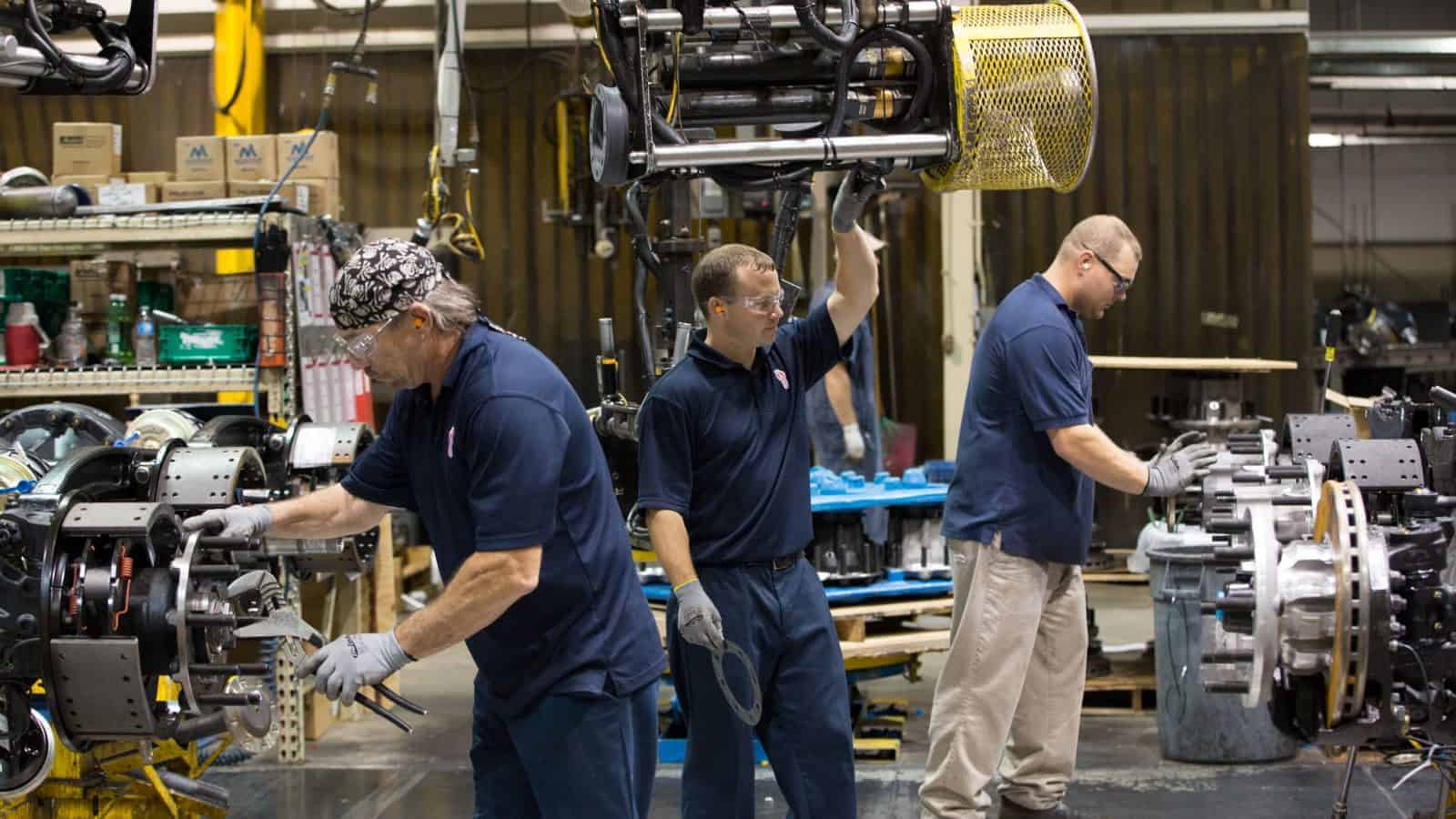NAM, State Partners Call for Immediate Senate Action on Tax Bill
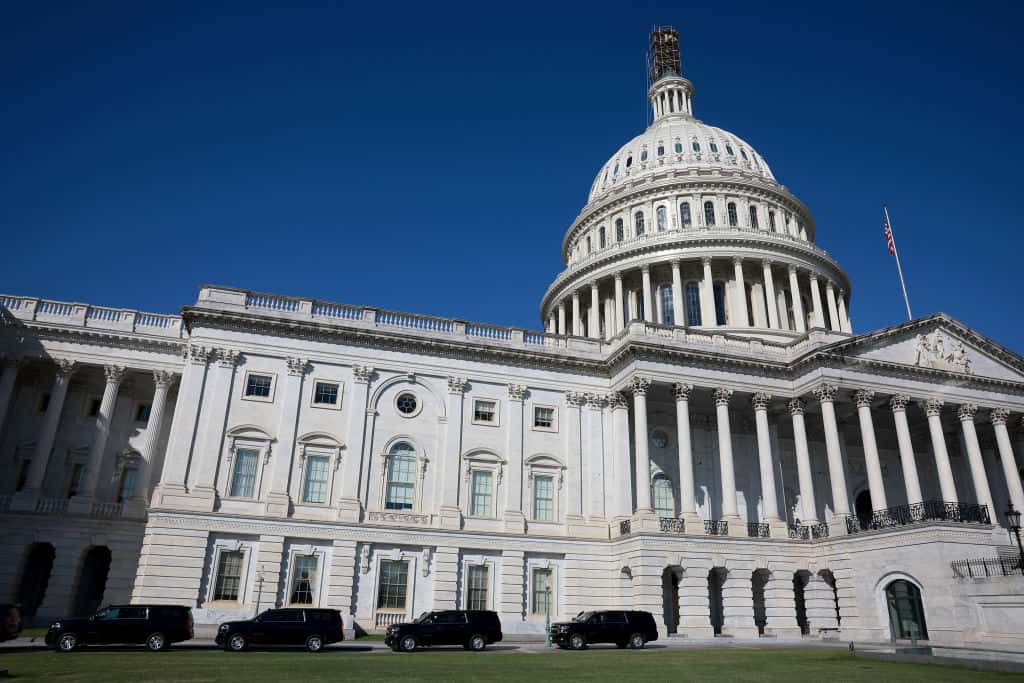
The Senate should immediately pass the Tax Relief for American Families and Workers Act, the NAM and its state partners told congressional leaders this week.
What’s going on: The NAM—along with 47 state manufacturing associations—on Monday continued its longtime, ongoing advocacy for the tax bill, which would restore three sector-crucial tax provisions: immediate expensing for domestic research and development expenses, enhanced interest deductibility on business loans and 100% accelerated depreciation for capital investments.
- “This critical legislation will support the ability of manufacturers in America to create jobs, invest in our businesses, give back to our communities and effectively compete in the global economy,” the groups said.
Why it’s important: If Congress fails to restore these key tax provisions, America’s competitiveness on the world stage will be under threat, they continued.
- “Without tax policies that encourage R&D and capital investment, countries with more favorable tax systems are capturing job-creating manufacturing investments.”
- China, for example, provides a 200% “super deduction” for companies’ R&D expenses, which is 10 times more than the U.S. gives. In 2022, the first full year following the expiration of immediate R&D expensing in the U.S., China’s R&D growth was three times that of the U.S.
What’s next: The Senate must not delay, the associations said. Congress must pass the Tax Relief for American Families and Workers Act—now.
The last word: “The breadth and depth of support for these critical, pro-growth tax provisions throughout the manufacturing industry shows the importance of immediate congressional action,” said NAM Vice President of Domestic Policy Charles Crain. “With additional damaging tax increases scheduled for next year, manufacturers cannot afford further delays.”
USTR’s WTO Lead Andrea Durkin to Lead NAM International Policy Team
NAM Advocates Global Trade Strategy That Will Open New Markets with Our Allies and Create Vast Opportunities for Manufacturers in the U.S.
Washington, D.C. – The National Association of Manufacturers announced that former Assistant U.S. Trade Representative for WTO and Multilateral Affairs Andrea Durkin is joining the NAM as the new vice president of international policy.
“Andrea brings a wealth of expertise to the job, with more than three decades of service in both the public and private sectors. As a leader in international trade negotiations, her deep understanding of international policy will enhance the NAM’s strategic objectives significantly as we continue to build off of successful engagements with our counterparts across Europe and the North American continent,” said NAM President and CEO Jay Timmons.
“As manufacturers in America look for new ways to reach global markets and the 95% of customers that live outside the borders of the United States, Andrea is set to lead an ambitious expansion of the NAM’s international policy operation. She will work to uphold our commitment to shaping a global trade strategy that opens new markets with our allies and trading partners around the world, which, in turn, will create vast opportunities for manufacturers in the U.S. to create well-paying jobs, innovate and achieve new milestones in improving the quality of life for everyone.”
Durkin is one of the nation’s foremost experts on international policy, drawing from decades of experience serving in Democratic and Republican administrations. As a senior executive in the Office of the President, she led trade negotiations and U.S. policy at the WTO and was responsible for committees on industrial subsidies, technical barriers to trade, government procurement, trade facilitation, customs and others. She was also the U.S. senior official for the Organization for Economic Co-operation and Development Trade Committee, G7 and G20 trade tracks.
In years prior, Durkin served in the U.S. Department of Commerce’s International Trade Administration, where she led a variety of negotiations, including free trade agreements in the Western Hemisphere, sectoral initiatives in the Asia-Pacific Economic Cooperation and trade-related aspects of United Nations’ multilateral environment and public health agreements.
-NAM-
The National Association of Manufacturers is the largest manufacturing association in the United States, representing small and large manufacturers in every industrial sector and in all 50 states. Manufacturing employs nearly 13 million men and women, contributes $2.89 trillion to the U.S. economy annually and accounts for 53% of private-sector research and development. The NAM is the powerful voice of the manufacturing community and the leading advocate for a policy agenda that helps manufacturers compete in the global economy and create jobs across the United States. For more information about the NAM or to follow us on Twitter and Facebook, please visit www.nam.org.
Manufacturers Call for Comprehensive, Transparent Section 301 Exclusion Process
Administration Must Pursue a Global Strategy To Open New Markets with Allies
Washington, D.C. – Following the Biden administration’s announcement of new 301 tariffs targeting Chinese products in sectors including electric vehicles, solar equipment, semiconductors, batteries, medical equipment and critical minerals, National Association of Manufacturers President and CEO Jay Timmons released the following statement:
“Manufacturers are concerned about the potential impact this broad swath of tariffs could have on our ability to produce the essential products needed to drive our economy forward, especially if critical inputs become less available and more costly.
“The NAM has long advocated for a full global strategy and a rules-based trading system that benefit manufacturers and workers by opening new markets with our allies. But when countries play by their own rules and create distortions, the U.S. should consider the use of all legislative and enforcement tools.
“The expansion of manufacturers’ global reach through a more open and more fair global trading environment has been pivotal to expanding U.S. industrial production to record levels, enabling businesses of all sizes to raise wages and create more high-skilled U.S. jobs. That is why manufacturers urge the administration to negotiate new trade agreements with allies and partners around the world and create a new, comprehensive and transparent 301 exclusion process to ensure that manufacturing in America is not being disadvantaged by our own government.
“Politicians and policymakers on both sides of the aisle need to understand that we can’t instantly reshape supply chains that took decades to build—especially the supply chains that bring us vital inputs and components essential to our everyday lives.
“Additionally, to fully unleash the power of manufacturing in the United States, policymakers must also ensure that America maintains a competitive tax and regulatory regime that allows manufacturers to ramp up domestic investment; streamline the permitting process so that new facilities and energy and infrastructure projects will not be held up by red tape; grow the manufacturing workforce; and protect innovation. Together, these policies will help manufacturers create jobs, grow wages and expand exports to the 95% of customers who reside outside of our border.”
-NAM-
The National Association of Manufacturers is the largest manufacturing association in the United States, representing small and large manufacturers in every industrial sector and in all 50 states. Manufacturing employs nearly 13 million men and women, contributes $2.89 trillion to the U.S. economy annually and accounts for 53% of private-sector research and development. The NAM is the powerful voice of the manufacturing community and the leading advocate for a policy agenda that helps manufacturers compete in the global economy and create jobs across the United States. For more information about the NAM or to follow us on Twitter and Facebook, please visit www.nam.org.
Manufacturers Participate in Small Business Week Capitol Hill Showcase
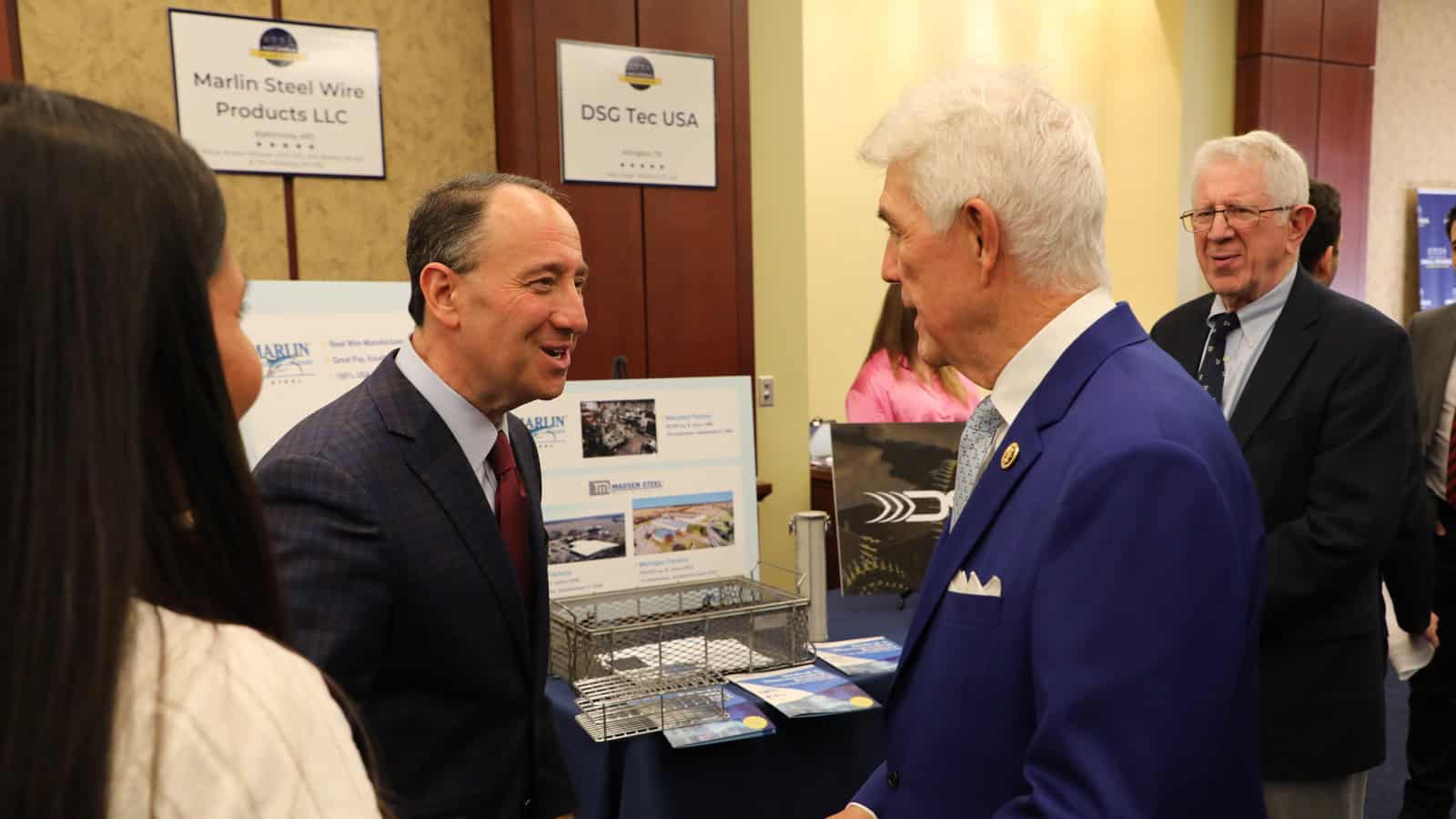
Manufacturers were among the select businesses invited to participate in last Wednesday’s Small Business Week showcase on Capitol Hill, and two in particular—Marlin Steel in Baltimore and its affiliated entity, Madsen Steel Wire Products, in Michigan and Indiana—made use of the time with lawmakers to advocate for some manufacturing-critical priorities.
What’s going on: Republicans on the House Small Business Committee hosted the event to shine a spotlight on the work of job creators throughout the country and draw attention to the federal government’s costly regulatory onslaught (Washington Examiner).
- Marlin Steel and Madsen Steel President and Owner and NAM board member Drew Greenblatt manned a booth with his family at the showcase displaying several products—such as metal baskets and racks—manufactured at his family-owned custom wire and steel products businesses.
- Greenblatt and others invited to the event had the opportunity to meet and speak with House Republican leaders, including Speaker Mike Johnson (R-LA), Majority Whip Tom Emmer (R-MN), Small Business Committee Chairman Roger Williams (R-TX) and Rep. Tim Walberg (R-MI).
The background: Marlin Steel, Madsen Steel and many other manufacturers thrived under a pro-growth tax provision in the Tax Cuts and Jobs Act of 2017 that allowed businesses to deduct 100% of their R&D costs in the year the costs were incurred.
- But in 2022 and 2023, that policy and two others—enhanced interest deductibility and 100% accelerated depreciation—expired.
- Ever since, manufacturers’ tax bills have increased, as companies, including Marlin Steel, have been required to amortize their R&D costs over five years, making innovation-crucial investments much more costly.
- “We want to grow jobs in our Indiana and Michigan factories, but we also need to give our talent the extraordinary tools needed to compete with China,” Greenblatt said. “We need immediate expensing to cover these huge investments. We put in $5 million but now have to pause investment. We need Congress and the president to act to allow us to hire more factory workers faster.”
Why it’s important: The showcase gave Greenblatt an opportunity to hammer home to lawmakers the importance to manufacturing of reinstating the expired tax provisions—and the need to act quickly to ensure that an additional suite of pro-growth tax measures, set to expire at the end of 2025, is extended.
- Another issue top of mind for Greenblatt and manufacturers everywhere is the flurry of regulations being handed down by federal agencies.
- In 2022, the cost of federal regulations to manufacturers was approximately $350 billion, a 35% increase from a decade earlier, according to an NAM study.
- Small manufacturers spend more than $50,000 per employee per year to comply with federal regulations.
Stop the struggle: “As a small business owner myself, I know all too well the many struggles small businesses face when trying to compete in the marketplace,” Chairman Williams said. “It is my hope that this … showcase serve[s] as an opportunity for more to learn about how invaluable Main Street is to our economy and our country.”
Related: Last week, the NAM unveiled videos on social media from other leading small and medium-sized manufacturers, adding their voices to key competitiveness priorities, featuring NAM board members Patricia Miller, CEO and founder of M4 Factory, Charles Sukup, chairman and treasurer, Sukup Manufacturing Co., and Nicole Wolter, president and CEO, HM Manufacturing.
Manufacturing Employment Stays the Same
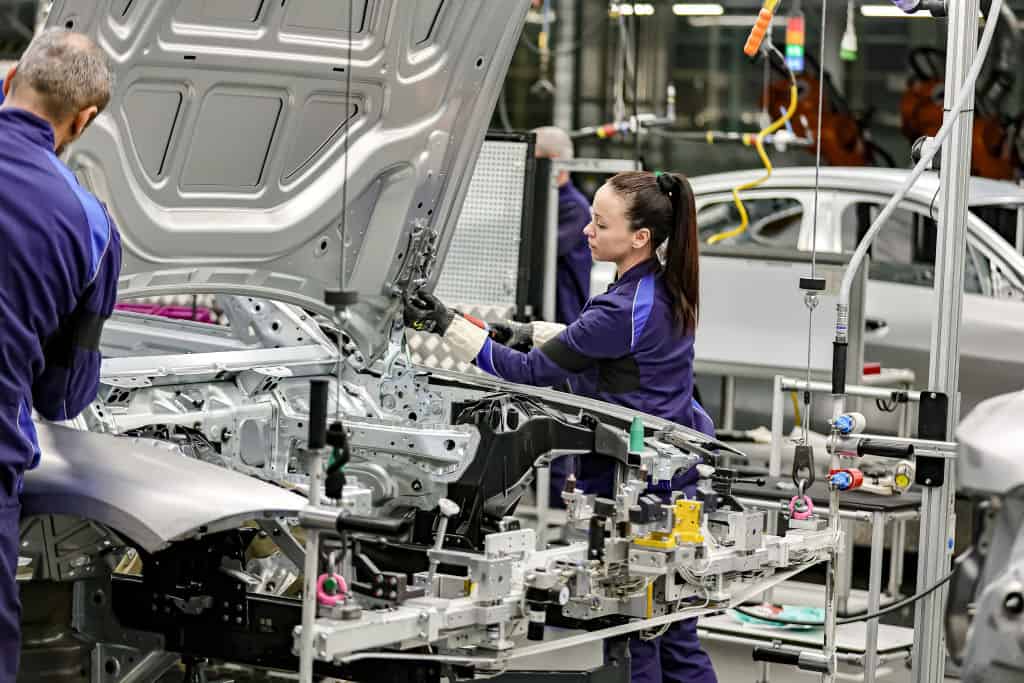
Employment in manufacturing remained essentially the same in April as it was in March, according to data out today from the U.S. Bureau of Labor Statistics.
- Overall employment increased by 175,000.
What’s going on: Manufacturing employed a seasonally adjusted 12,961,000 workers in April, up just marginally from 12,953,000 in March and 12,957,000 in February.
- The number of people employed in manufacturing was also up only slightly from April 2023, when it was a seasonally adjusted 12,941,000.
Durable goods vs. nondurable: There were a seasonally adjusted 8,144,000 workers in durable goods manufacturing in April, flat from March’s number.
- Nondurable goods had a seasonally adjusted 4,817,000 employees, also essentially unchanged from the prior month.
Workweek: The average workweek in the manufacturing industry was unchanged from March, at 40.0 hours.
- In the larger economy, the workweek for all nonfarm employees inched down by 0.1 hour in April, to 34.3 hours.
Earnings: Average earnings in manufacturing were also little changed from March to April, coming in at $33.61 an hour in the latest reading, down only slightly from $33.65, but up from February’s $33.44.
NAM and Allies: PM2.5 Standard Will Hurt Manufacturers, Economy

The EPA’s overly stringent final rule on particulate matter puts continued U.S. innovation and economic growth in jeopardy, the NAM and allied groups told congressional leaders Monday.
What’s going on: In March, the EPA lowered the standard for particulate matter, or PM2.5, in its National Ambient Air Quality Standards rule by 25%, down from 12 micrograms per cubic meter of air to nine.
- This week, the NAM, along with 58 allied organizations, urged key House and Senate members to act soon to “stop this harmful rule before it takes effect.”
Why it’s important: The probable negative effects of allowing the change include “making it more difficult to create jobs, build cutting-edge factories and lead the world in the development of products that will shape modern life in the decades ahead,” the groups said.
- Compliance costs could exceed $1.8 billion, according to the agency’s own estimates.
- The lowered limit also puts the U.S. at a great disadvantage to global competitors, which “have adopted standards that are less stringent than the EPA rule and are phased in over a much longer time frame.”
What needs to happen: Congress should pass a resolution of disapproval regarding the new standard immediately.
Manufacturing Job Openings Decline
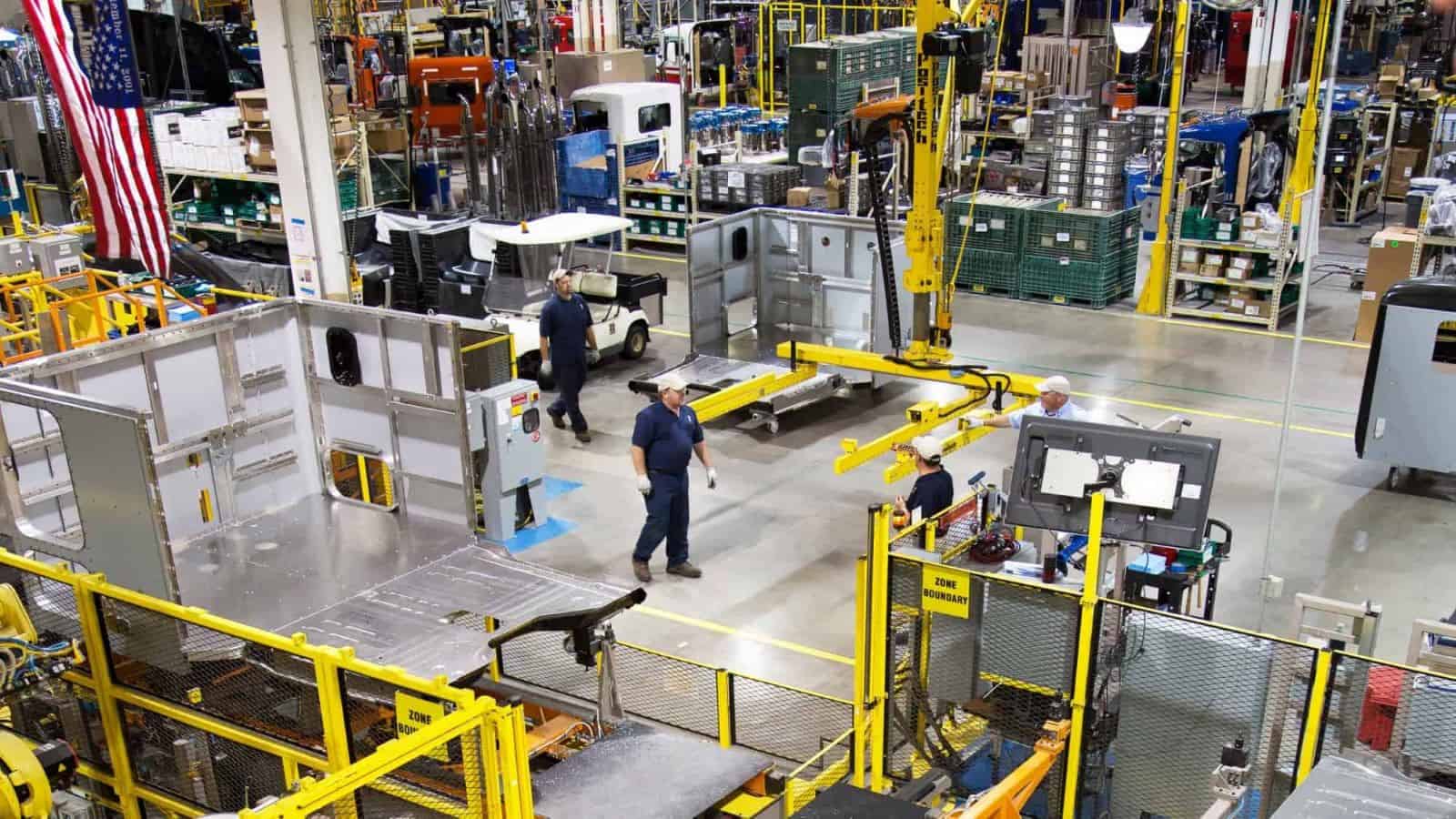
The number of U.S. job openings in manufacturing decreased in March, according to new data from the U.S. Bureau of Labor Statistics.
- Meanwhile, the number of job openings in the larger economy remained about the same, at approximately 8.5 million.
What’s going on: There were 570,000 open positions in the U.S. manufacturing industry in March, down from an adjusted 587,000 in February.
- Open positions in durable goods manufacturing also declined, to 353,000 in March from an adjusted 379,000 in February.
- Openings in nondurable goods, however, inched up to 217,000 from an adjusted 208,000.
Hires and quits: Hiring in the sector remained about the same as the last reading, coming in at 323,000 in March (down marginally from February’s 324,000).
- Total separations—which include quits, layoffs, discharges and other severance of employment—decreased slightly in March (to 330,000) from February (an adjusted 338,000).
House Committee Forms Working Groups to Revive Tax Provisions

Following a steady drumbeat of advocacy by the NAM, the House Committee on Ways and Means has formed tax working groups dedicated to finding legislative solutions to the scheduled expiration of pro-growth tax policies at the end of 2025.
What’s going on: Each of the 10 working groups will focus on an area of the economy that will be affected by the sunsetting of certain measures in the Tax Cuts and Jobs Act.
- Ways and Means Committee Vice Chairman Vern Buchanan (R-FL) was selected to lead the American Manufacturing tax working group.
- The members of Congress assigned to this team will examine the effects of pro-growth tax policies on the manufacturing sector.
Why it’s important: “Tax reform was rocket fuel for manufacturers: 2018, the first year the Tax Cuts and Jobs Act was in effect, was the best year for manufacturing job creation in the previous 21 years,” said NAM Managing Vice President of Policy Chris Netram. “But those gains are at risk as key tax provisions expire, making it more difficult for companies throughout the supply chain to hire, invest and grow. Congress must build on the promise of tax reform to ensure that manufacturing in America remains strong.”
- Earlier this month, Husco President and CEO and NAM Executive Committee member Austin Ramirez testified before the House Ways and Means Committee about the TCJA’s positive effect on manufacturing growth and the need for Congress to preserve the pro-growth business provisions of that legislation.
- Their expiration “mean[s] that pass-through businesses like Husco will have more of our income subject to a higher rate of tax,” Ramirez said. “At the same time, the pass-through deduction will expire completely, doubling down on the tax hikes that we face. … [A]llowing tax reform to sunset will undermine much of the progress we’ve made since 2017.”
What we’re doing: The NAM will be engaging with each of the tax working groups over the next several months to ensure that manufacturing-critical tax provisions are extended and reinstated.
- To get involved, reach out to NAM Senior Director of Tax Policy Alex Monié.
Inflation Stayed Elevated in March

Inflation, as measured by the Federal Reserve’s preferred gauge, remained elevated last month (CNN).
What’s going on: “The Personal Consumption Expenditures price index … accelerated to 2.7% for the year ended in March. … That rate was above economists’ expectations for a 2.6% gain and landed above February’s reading of 2.5%.”
- Prices increased 0.3% on a monthly basis, the same pace as in February.
Core PCE: So-called “core” PCE, which excludes often-volatile food and energy prices, remained steady at 2.8%.
Spending: Consumer spending stayed strong in March, rising 0.8% from February and exceeding economists’ expectations.
Noncompete Ban Would Disrupt Manufacturing in the U.S.

The Federal Trade Commission’s vote this week to prohibit noncompete agreements between employers and their employees threatens manufacturing in the U.S., the NAM said Tuesday.
What’s going on: In a 3–2 vote Tuesday, commissioners finalized a rule that, like a draft version circulated last year, “would deem practically any noncompete clauses for paid staff, independent contractors and unpaid workers to be an unfair method of competition rendered unenforceable, and [would require] employers to tell current and former employees they’ve stopped enforcing them” (Law360, subscription).
- The final rule is set to go into effect 120 days after it is published in the Federal Register, but lawsuits have been filed against it already, and additional legal action is expected.
What’s changed: One change made to the final rule following the receipt of more than 26,000 comments on it allows existing noncompete agreements with senior-level executives to remain in effect.
- Another difference between the rule’s prior iteration and the final is to the ban’s sole exception. The draft “permitted noncompetes for individuals selling their business or a substantial stake of at least 25%.” That threshold is not in the final version.
Why it’s problematic: The rule “is unprecedented and threatens manufacturers’ ability to attract and retain talent,” said NAM Managing Vice President of Policy Chris Netram.
- “In addition, [it] puts at risk the security of intellectual property and trade secrets—anathema to an industry that accounts for 53% of all private-sector R&D.”
- A noncompete ban would disrupt the majority of U.S. manufacturing operations, a 2023 NAM survey found.
What’s next: The NAM is considering all options in response to the final rule and is in active discussion with congressional leadership and the relevant committees of jurisdiction.
